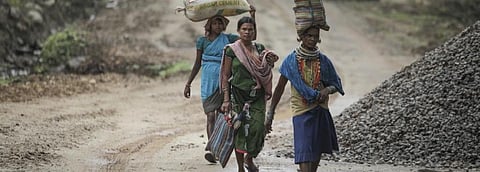How India remains poor: Nine billionaires own as much as half the people
Nine Indian billionaires own as much as the bottom 50 per cent of our country. Reflect on that for a minute: nine individuals own as much as 65 crore people.
While India’s constitution commits it to the principle of equality, some citizens of India remain more equal than others. A female domestic worker will not earn as much in 22,000 years as the chief executive of a multinational corporation makes in a single year.
While a few individuals afford to fly in private jets and spend crores on luxuries, there are also those who are struggling to meet their daily needs.
Take Buchhu Devi (name changed), a Mahadalit from Bihar. She lives with her husband, who is a farm labourer, and their three children. She gets up at 3am to cook, clean and prepare breakfast and lunch for her family. There is a well nearby but because she is a Dalit she is not allowed to draw water from that well; she instead travels 3 km to collect water. She does this thrice in a day.
Apart from her daily regular household chores of fetching water and fuelwood, washing, cooking, cleaning the house, and helping her children with studies, she also works at a road construction site from 8 am till 5 pm. Her day ends at midnight. She says: “I have no time, not even time to die.”
Many Indians accept such inequality and discrimination — wealth, gender, caste, income — as inevitable. However, inequality is a policy choice that governments make. It is time for these excluded and marginalized voices to come together to protest this unjust reality.
Such an effort is being made this year as part of the Global Week of Protest against Inequality being observed from 18th to 25th January. This coincides with the gathering of elites in the World Economic Forum at Davos, Switzerland.
From Delhi to Dantewada, organizations across 16 states are mobilising to protest rising inequality under the aegis of Fight Inequality Alliance, a group of civil society organizations from across the globe that have come together to fight the growing crisis of inequality. This Global Week hopes to amplify and bring to the fore voices of youth, workers, persons with disabilities, Dalits, Adivasis, and women and girls are coming together to oppose rising inequality.
The effort is to reach out to as many people as possible and bring out the message that a different, more equal India is possible. In Delhi, youth from poor communities are performing street plays in their communities. In West Bengal and Jharkhand, mine workers are campaigning for workers’ rights. In Chhattisgarh, cycle yatras will be held to mobilise people against increasing inequality and trigger discussions about ways of reducing it. In Uttar Pradesh, young people across 15 districts of the state will be mobilised against inequality.
Continued discrimination in education against women and girls was discussed across the country on the International Day on Education on January 24, 2020. Persons with disabilities are mobilising against their continued exclusion and failure to implement existing legislations for their empowerment. India’s performance against SDG 10 commitment to reduce inequality would be discussed.
Overall, more than a million people will be reached through the campaign to take forward the message that a better India is possible for all Indians, not just the top 1 per cent.
Oxfam India is part of the Fight Inequality Alliance


